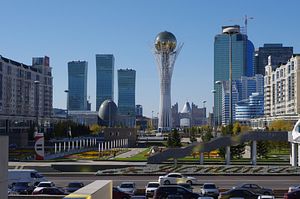After almost 30 years in power, longtime Kazakh President Nursultan Nazarbayev stepped down just ahead of Nowruz, the day of spring rejuvenation. But instead of revitalizing the political climate, the move has sparked fear and uncertainty among young people. Nearly 51 percent of Kazakhstan’s population was born under Nazarbayev’s rule. The first proposals made by new interim President Kassym-Jomart Tokayev were to rename the capital city, Astana, and the main streets of provincial cities in honor of Nazarbayev. The news caused an outcry among youths, who started using the hashtag #SaveAstana online. One of the most prominent social groups speaking out were Western-educated Kazakh youth.
The number of Kazakhs who have studied abroad has risen by 140 percent in the last decade, and the Western world is one of their top destinations. These highly educated Kazakhs, upon return, are eager to bring more social change to the country based on their experiences abroad. However, too many of them are afraid. Kazakhstan should find ways to employ the skills and knowledge of those who study abroad, particularly in the West, to transform its civil society sector. This move will both ensure better utilization of the significant number of highly educated youth and increase the space available for social expression.
Politically disenchanted youth lean toward civic activism because the state excludes them from official decision-making processes. The state wants to employ the competencies of highly educated young people in a controlled, rather than subversive or spontaneous, manner; it sees any form of independent activism as a threat. At the same time, the country’s leadership has often declared that it wants to have a strong third sector, a strong civil society. These two views are as yet unreconciled. A win-win solution would be to attract recent Kazakh graduates from Western institutions to higher education in Kazakhstan as instructors to share and pass on their knowledge through civic involvement and service learning training programs.
First, education positively influences all forms of engagement. The university campus is an ideal environment for student activism and service learning, which are fundamental prerequisites of civic engagement. Currently, Kazakhstani higher education curricula do not do enough to foster students’ soft skills: acting independently, problem-solving, critical thinking, and so on. By deploying their expertise, Western graduates could help to bridge that gap.
Second, recent graduates from Western institutions could demonstrate how the Western system works in practice. Soviet-era university management lacks that experience. Academic freedom is a vital component of developing critical thinking, which is another crucial factor needed to increase youth civic involvement.
Third, this approach could increase the employment opportunities available to returning Western graduates. It takes an average of six months for a recent graduate from a Western university to find a job in Kazakhstan.
Finally, this proposal is cost-effective. By using its own recently educated professional cadres, Kazakhstan would spend less money on foreign language instructors and consultants.
One possible concern about this knowledge exchange and peer-learning program might be that it would fail to win over Western graduates, who tend to be looking for stable and financially lucrative jobs. To address this problem, this initiative should posit itself as an integral first step on the career paths of Western-educated young professionals, making it more competitive and prestigious.
By attracting recent Western graduates to higher education, Kazakhstan could empower its youth on many levels. Improving the exchange of knowledge and experience increases youth’s interest in civic initiatives, as young people improve their understanding of how to interact with the state and bring about social change. This kind of interaction contributes significantly to developing grassroots civil society. Immersing more youngsters in the civic realm gives them a voice and helps invest them with greater responsibility, and a more powerful sense of belonging. As Abay, the noted Kazakh poet and philosopher, said, “Idle youth is a misfortune” — this program could help prevent such idleness.
We cannot ignore our brilliant minds, and we should not fear them. We cannot always build the future for our youth, but we can build our youth for the future. On the basis of this simple truth expressed by Franklin D. Roosevelt, we can create a united and more responsive nation, with a view to building a common prosperous future.
Sergey Marinin is a visiting fellow at the Central Asia Program at George Washington University. He specializes in politics and democratic governance in Central Asia.

































